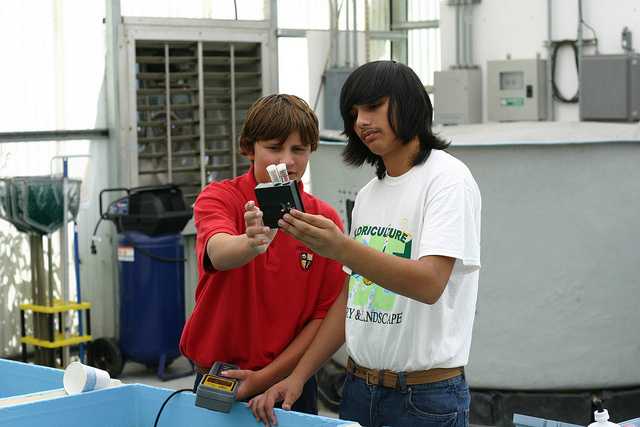
Two-Track Education and Training for Aquaculture
June 13, 2017
By John Nickum
 Students use math and chemistry principles learned in the classroom to calculate salinity levels and analyze water quality in grow-out tanks. Without learning the “how to do it” skills John Nickum wades in on whether a young person preparing for a career in aquaculture should pursue a broad-based
Students use math and chemistry principles learned in the classroom to calculate salinity levels and analyze water quality in grow-out tanks. Without learning the “how to do it” skills John Nickum wades in on whether a young person preparing for a career in aquaculture should pursue a broad-basedShould a young person preparing for a career in aquaculture pursue a broad-based, biology-focused education program, or a highly specialized vocational training program in aquaculture? What about an older individual who wants to, or has to, change careers? There has been a lot of discussion within the aquaculture community about these questions. I am not aware of a consensus on these questions and I doubt there will be one; so much depends on individual interests and circumstances.
I suspect that opinions about “the best option,” including my own, are influenced by the path the speaker/writer followed for their career. My first experience with fish propagation involved rearing rainbow trout for a local restaurant 55 years ago when I was a graduate student. My education had been strictly academic, but my training in fish propagation was all “O-J-T” (on-the-job training). I like to claim that I have some experience with both training and education as it pertains to aquaculture, based on my own experience as a university teacher and career as a manager with the US Fish and Wildlife Service. I must acknowledge, however, I identify more strongly as an educator.
Although the terms “education” and “training” are frequently used interchangeably, they are different; at least in the mind of this “old professor.” Training a student is typically focused on developing a specific set of skills that are needed to do a specific job, or jobs, efficiently. Training is job-focused. Education typically takes a broader approach, including greater emphasis on critical thinking. An education program may enable students to acquire many of the same skills taught in training programs, but it usually is less job-focused. Education programs attempt to provide broad foundations that will be useful in many occupations, not just a few targeted jobs. Broad-based education programs typically include an array of formal courses to provide the background necessary for understanding principles behind the myriad aspects of propagating aquatic animals, or, increasingly, plants.
I probably am somewhat biased toward programs based on a broad foundation of academic coursework, followed by training in specific skills; that was the path I followed. I think a college education should be just that… an education; specialization comes later. Most young people in the age range of 18 to 20/21 really don’t know yet what they want in terms of employment; therefore, they need a broad background. When I entered college, I was trying to decide whether to be a high school football-baseball coach, or a nuclear physicist. It was only after being exposed to courses in math, physics, chemistry, and biology that I learned my real interests were in vertebrate zoology, ecology, and ultimately aquaculture and fish health.
A broad educational program equips students, and workers, to deal with the ever-changing demands within specific jobs, as well as evolving job markets. An aquaculturist with experience in the methods used in 1900, or even 1950, would experience a very steep learning curve if placed in a present day aquaculture production facility, especially if that person had only hands-on skills she/he had learned on the job. A combination of “book learning” and O-J-T would make the individual much more adaptable to dynamic job requirements.
I suggest the first step for most students preparing for a career in aquaculture, whether their career goal is rearing fish, or shellfish, or crustaceans should start with basic coursework in biology. Biology provides the foundation for later specialization; however, becoming a competent biologist in today’s world requires more than just biology. Modern biology requires a foundation in mathematics, physics, and chemistry, as well as biology. Additional basic courses, such as animal physiology, vertebrate anatomy, embryology, genetics, and ecology strengthen the foundation before specializing in ichthyology, fisheries ecology, limnology, invertebrate zoology, algalogy/aquatic plants, marine ecology, and other courses pertaining to aquatic animals. Basic microbiology and pathogenic microbiology, plus, parasitology are needed to equip the student for solving disease problems. Inasmuch as feeds and feeding are typically the most expensive aspects of aquaculture production, at least one course in animal nutrition would be very useful. An argument can be made that the program I envision would require an undergraduate major in biology/zoology followed by a Master’s degree in some aspect of aquaculture.
Training programs typically do not require a long list of courses, but emphasize working environments in which the student learns about measuring and maintaining essential water quality parameters, spawning, recognizing early signs of disease conditions, normal feeding behavior, proper feed storage, signs of environmental stress; as well as, how to maintain and repair the mechanical and electrical systems of the facility.
Whichever path a student follows, a few fundamental concepts must be central to his/her education and/or training: “Know your fish; or shellfish; or crustacean.” Also, “know the system/environment in which you are rearing them;” and “clean water equals few problems, but dirty water and stressful environments equals endless problems.” Whether an individual is trained, or educated, she/he must understand these basic concepts. Broad-based education programs help workers understand the “why” factors of their jobs, but without learning the “how to do it” skills, their “book learning” may leave them ill-equipped to meet the demands of their employment, and their employer. Aquaculture is not a career for the ill-prepared.
Advertisement
- Technology transfer helps grow Alaska mariculture
- Industry players see rosy future for offshore fish farming





